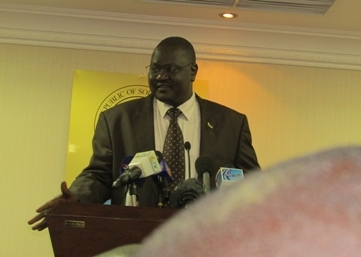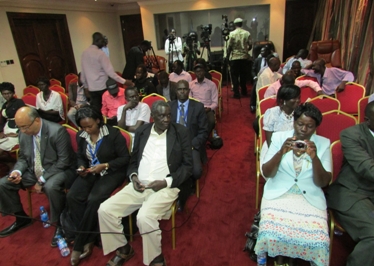Journalists express scepticism over S. Sudan media laws
September 10, 2014 (JUBA) – Long-delayed media laws approved by president Salva Kiir on Tuesday have been met with scepticism from South Sudanese journalists, with many expressing concern at the the government’s decision to ink the document without any media representatives present.

“The good news is that the media bill today (Tuesday) is signed into law. The president has assented to it,” Ateny told reporters at the Presidential office in the capital, Juba.
“I know there has been some inconvenience because this (signing) should have happened in September last year, days after the parliament passed it,” he added.
According to Association of Media Development in South Sudan (AMDISS), draft of the media bills was presented to parliament in 2006, a year after the then government of Southern Sudan was formed in accordance with the 2005 Comprehensive Peace Agreement (CPA).
The media laws pertain to access to information, media authority and broadcasting and cooperation law.
The bills provide measures for the creation of a national, independent public service provider and the establishment of an independent body to oversee content and deal with complaints, as well protecting the right of every citizen, including journalists, to access official information.
After years of delay in parliament, lawmakers finally agreed on the final draft of the bills in September 2013, however, Ateny claimed the president did not receive the document until Friday.
“Somebody in the ministry of justice put the bills in a bad lock and we only found them last week,” Ateny told journalists on Sunday at an informal forum in Juba.
He said copies of the laws will be presented to AMDISS and other media organisations next week.
STEP FORWARD
AMDISS chairman Jacob Akol said the passing of the bills into law is a step forward in the protections of journalists’ rights in South Sudan.
“We need to conduct some post-mortem before making [any] verdict if anything has been changed or not [as a result of the media laws],” Akol said on Tuesday.
“You know we have had a long time of deception in this area of media bills that we have a right to be sceptical,” he added.
According to Akol, the media bills passed by parliament will also exempt journalists from being charged with a criminal offence as a result of something they have reported on.
“Within that law, in fact you should not be arrested for criminal offense just because you have written something against somebody,” he said.
Oliver Modi, the chairperson of the Union of Journalists in South Sudan (UJOSS), has welcomed the new said the laws, saying they come “after we have suffered a lot”.
“The media industry is overwhelmed with happiness. Read, understand and own them (media laws),” he told reporters on Tuesday.
SPEAKER WELCOMES BILLS
South Sudan’s parliamentary speaker has also welcomed the signing of the country’s media bills into law, saying freedom of expression should be non-negotiable in any nation that is serious about democracy and good governance.
Speaker Magok Rundial told reporters on Wednesday that said the media must not be abused for selfish interests, but rather utilised responsibly to improve the quality of life of others.
“Everyone has a byline when it comes to the vital role which media plays. People are expressing themselves through media and it must be used in a manner that would bring about social and economic development for our respective countries,” said Rundial.
“The signing of the media bills into law by the president is an opportunity for the media platforms and its success lies in all of our hands,” he added.
According to the speaker, freedom of expression and press freedom is a precondition for social and economic development and must be protected.

“This spirit should be activated, so that together with the leadership supports [a] peaceful settlement of the current crisis and confusion,” he said.
“In this 21st century, the internet, particularly the social media, is one of the powerful tools that citizens are using to express themselves. That media must be listened to and constructive issues raised must not be ignored, but respected,” Rundial adds.
He said citizens needed to be inspired to effect change, rather than experiencing a sense of helplessness, adding that social media was a way for people to interact and present their views with others.
“People want their news instantly and they don’t want to just receive it, they want to comment and be involved,” he said, while urging media representatives to ensure accuracy and practice responsible journalism.
DOUBTS REMAIN
However, many in South Sudan’s media community fraternity remain unconvinced of the government’s commitment to guaranteeing press freedoms.
“What is particularly worrying is that the president decided not to meet the journalists during the signing,” said the Juba-based reporter, who asked not to be identified.
Journalists in South Sudan are routinely subject to arbitrary arrest by security agents, while newspapers and radio stations have previously been shut down after reporting on matters considered critical of the government.
The Committee to Protect Journalists (CPJ) says at least 10 South Sudanese journalists are currently in hiding in the country since fighting broke out in December last year.
A Catholic-run radio station also remains off air in Juba after security officials shut down its premises in mid-August.
(ST)
– S. Sudan president signs media bills, calls for peace
– S. Sudan president signs broadcast bill into law
– S. Sudanese minister warns media against pro-rebel reporting
